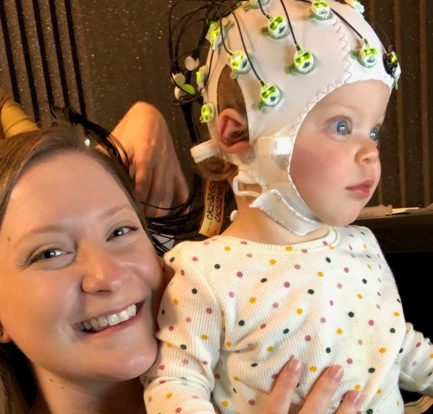Idiolects make everyone sound different. Similar to a dialect, an idiolect is a personal dialect. Just like groups of people have regional dialects and accents, every individual person has a unique way of speaking (or signing). They may vary in how fast or slow they talk, how they pronounce certain words, how breathy or raspy their […]
Your baby’s vocabulary is more than just the words they can say.
Everyone has both a receptive vocabulary and a productive vocabulary. Combined, they hold all the words we know. A vocabulary is well known to be all the words a person knows. A receptive vocabulary describes all the words a person understands, and is also called a comprehension vocabulary. A productive vocabulary describes all the words […]
More than words: infants also learn complex rules for combining words and phrases
Did you know that the sentences you say aren’t just a string of words in an order, but clusters of phrases that build on each other, like building with blocks? Scientists study the structure of a language and the way words relate to each other, called syntax. The syntax, or form, of a sentence is […]
Important EEG Waves
When we measure baby brainwaves, what do we measure and what does it mean? When scientists measure brainwaves, they find a lot of them happening at different times. Scientists call these waves components, but we will continue to call them waves in this post. Some of the waves show up […]
What is a dialect? Do I have one?
Someone doesn’t sound like you. Are they speaking in a dialect? A dialect is a variety of a language that signals where a person comes from. When you hear people talk, not everyone sounds the same, even when they are speaking the same language! This is often because they are speaking in different dialects. When […]
How do Siri and Alexa sound so much like people and not robots? One way: formants!
Formants are used in all sorts of voice-related technology and analysis. Formants are bands of high-energy sound that occur at certain frequencies. Does this sound complicated? How about this: Have you been in a small echoey room or stairwell and noticed the echoes were stronger when you spoke or sung a certain pitch? The room […]
Scientists can’t ask babies what they think, but we can see where they look.
Where infants look can tell us what they know about the world. As any parent knows, infants cannot readily tell you what they want or need. This also means that they cannot directly express what they know. For developmental psychologists, who are often interested in what infants know when, this can be pretty challenging. So […]
What is a language? How can we define it?
Language lets people share complex ideas. A language is a system of communication consisting of a system to form words, a system to assign meanings, and a grammar. When considering what language is, there are many different factors to take into account. One of these factors is grammar, which is the set of rules that […]
What are Broca’s Area and Wernicke’s Area?
These two areas of the brain are well-known to be used to understand and produce language. Broca’s area is the part of the brain most commonly linked to language production. One way that people can learn about the function of Broca’s area is by studying people who have damage to this brain region. In fact, […]
Lemma: the essential form of a word
What do you know when you know a word? You probably know many forms of the same word, with small modifications, or what linguists call inflections— small grammatical changes that don’t really change the meaning of the word. While the technical term for the whole group of possible forms together is a lexeme, the most […]

